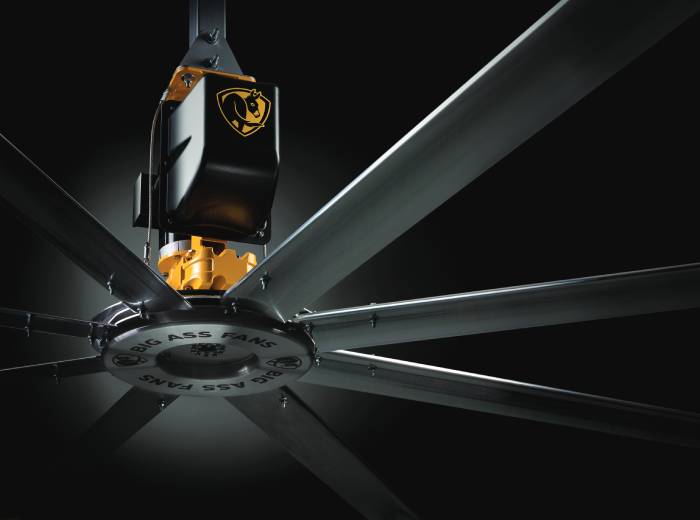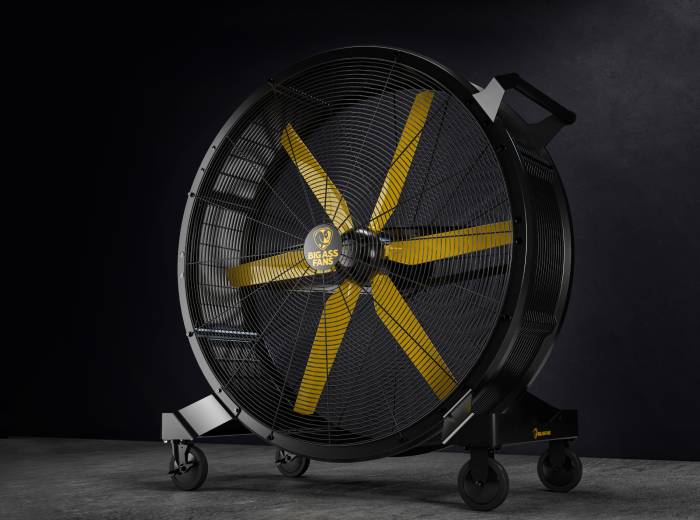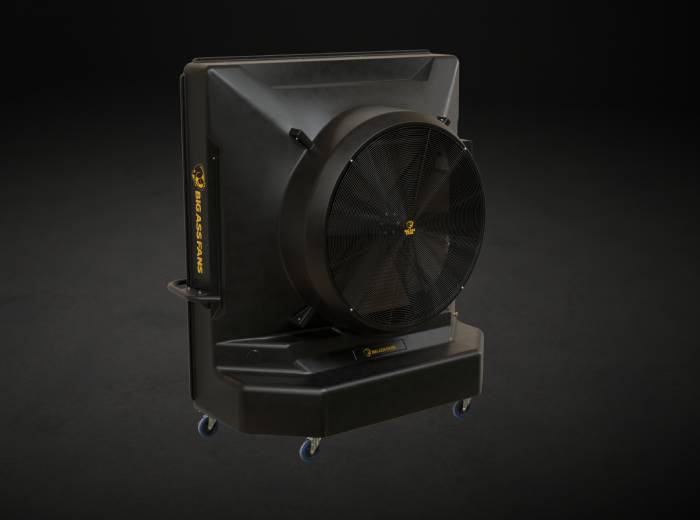.jpg?width=1220&height=600&name=shutterstock_2062322336%20(1).jpg)
The Role of Fans in Modern Agriculture
In farming and agriculture, maintaining an optimal environment is crucial for maximising crop yield and ensuring the health and productivity of livestock. One way to achieve this is through the use of industrial ceiling fans.
These fans are used to regulate temperature, control humidity, and improve air circulation across various agricultural settings. From greenhouses to barns and crop storage facilities, industrial fans play a vital role in helping farmers create the ideal conditions for their operations.
This blog will explore the types of industrial fans used in agriculture, their benefits, and how they contribute to improving efficiency and productivity.
Types of Industrial Fans Used in Agriculture
Industrial fans used in the agriculture sector come in various sizes and designs, each tailored to different needs. Understanding the different types of fans can help facility managers choose the best options for their specific needs.
Industrial Ceiling Fans
Industrial ceiling fans are commonly used in barns and other large, open spaces where air circulation is needed over a wide area. These fans are typically large and operate at slow speeds, allowing them to move large volumes of air efficiently. They help distribute heat evenly during colder months and provide cooling during the summer, reducing heat stress in livestock. Ceiling fans also help prevent condensation and reduce the risk of mould developing in stored crops like hay and grain.
For example, our Powerfoil industrial ceiling fans are designed with the size, power and efficiency to tackle oppressive temperatures or stagnant air in large spaces. They are well-suited to warehouses, greenhouses, barns, storage sheds, and other facilities.
Exhaust Fans
Exhaust fans are essential for maintaining fresh air in enclosed spaces, such as barns, and poultry houses. These fans work by ‘pulling’ stale, hot air out of the building and replacing it with cooler, fresh air from outside. Exhaust fans are often installed along with ventilation systems to ensure a continuous flow of air, preventing the buildup of humidity and gases like ammonia, which can be harmful to produce and livestock.
Circulation Fans
Circulation fans are typically mounted on walls and are used to promote airflow within a specific area. These fans are highly effective in greenhouses, where they ensure even air distribution around the plants, preventing pockets of hot or humid air from forming. In livestock barns, circulation fans help keep animals cool by promoting air movement, which lowers the overall temperature. These fans help dry bedding material, preventing mould and bacteria growth.
Evaporative Coolers
Evaporative coolers are especially useful in hot climates where excessive heat can impact plant growth and livestock health. These fans work by drawing warm air through water-soaked pads, cooling the air through evaporation before it is circulated throughout the area. This method is highly energy-efficient and can significantly reduce temperatures in greenhouses and barns without relying on traditional air conditioning systems.
For example, our Cool-Space evaporative cooler is designed with large-scale industrial and agricultural settings in mind. It brings fast relief, quickly bringing the temperature down in outdoor or indoor facilities. Perfect for warehouses, greenhouses, or storage sheds.
Portable Fans
Portable fans offer flexibility and can be moved around as needed to provide targeted airflow in specific areas. These fans are commonly used in smaller barns or temporary crop storage facilities. They are particularly helpful during harvest season when farmers need to dry crops quickly to prevent spoilage or during extreme weather conditions when cooling is necessary for livestock.
For example, our Sidekick fan provides a flexible cooling solution for indoor or outdoor spaces. It comes on wheels, allowing for easy relocation around your farm as your needs change.
Benefits of Industrial Fans in Agriculture
The use of industrial fans in agriculture offers several key benefits that directly impact productivity, animal welfare, and crop quality. Some of these benefits include:
- Improved Animal Health: By reducing heat stress and ensuring proper ventilation, industrial fans help keep livestock healthy, leading to better growth rates and productivity.
- Enhanced Crop Quality: Proper air circulation prevents diseases, mould, and mildew in both growing plants and stored crops, ensuring higher-quality produce.
- Energy Efficiency: Industrial fans, especially those using evaporative cooling technology, provide a cost-effective and energy-efficient solution for controlling temperature and humidity.
- Reduced Risk of Spoilage: In storage facilities, fans help prevent moisture buildup, reducing the risk of crop spoilage and financial losses.
Applications of Industrial Fans in Agriculture
Industrial fans have a wide range of applications in agriculture, each contributing to improved productivity, animal welfare, and crop health. Below are some key uses of industrial fans across different farming sectors.
Livestock Barns
Livestock barns can become extremely hot and humid, especially during the summer months. Industrial fans are used to regulate temperature and improve air quality, ensuring that animals remain comfortable and healthy. By reducing heat stress, fans help improve feed conversion rates, milk production in dairy cows, and overall growth in animals such as poultry and swine. Proper ventilation also helps prevent the spread of respiratory diseases, which are often exacerbated by poor air quality.
In poultry houses, where birds are kept in large numbers, heat and humidity levels can rise quickly. Industrial fans, particularly exhaust and circulation fans, help keep the air moving, providing fresh oxygen, removing ammonia and other harmful gases.
Greenhouses
In greenhouses, where temperature and humidity control are essential for plant growth, industrial fans play a critical role in ensuring a stable environment. High humidity can lead to fungal diseases and poor pollination, while uneven temperature distribution can result in stunting plant growth. Circulation fans ensure even airflow, preventing the formation of hotspots and creating an environment where plants can thrive. In combination with exhaust fans, these systems help maintain the ideal balance of heat, light, and humidity for optimal crop production.
Crop Storage Facilities
After harvest, crops such as grain, hay, and fruits need to be stored in conditions that prevent spoilage. Industrial fans help in drying these crops by ensuring that air circulates through the storage area, reducing moisture content and preventing mould growth. Proper air circulation in crop storage facilities helps extend the shelf life of produce and reduces the risk of financial losses due to spoilage.
Dairy Farms
In dairy farms, industrial fans are used to cool cows during the hot months, as excessive heat can reduce milk production. Ceiling fans and circulation fans provide consistent airflow, helping cows stay cool and comfortable. A comfortable environment translates into better milk yield, as cows are less likely to experience heat stress, which can negatively affect their ability to eat and produce milk.
Final Thoughts
Industrial fans are a valuable tool in modern agriculture, playing a vital role in maintaining the optimal environmental conditions needed for crop growth and livestock well-being. From regulating temperature in barns to improving air circulation in greenhouses, these fans ensure that farmers can operate more efficiently and productively.
As the agricultural industry continues to grow and adapt to changing climates and market demands, the importance of industrial fans will only become more prominent, helping farmers meet the challenges of tomorrow.
If you’re looking for cooling solutions for your farm or agricultural business, look no further than our range of industrial fans. Whether you need overhead or directional fans, or evaporative coolers, we’ve got you covered!





